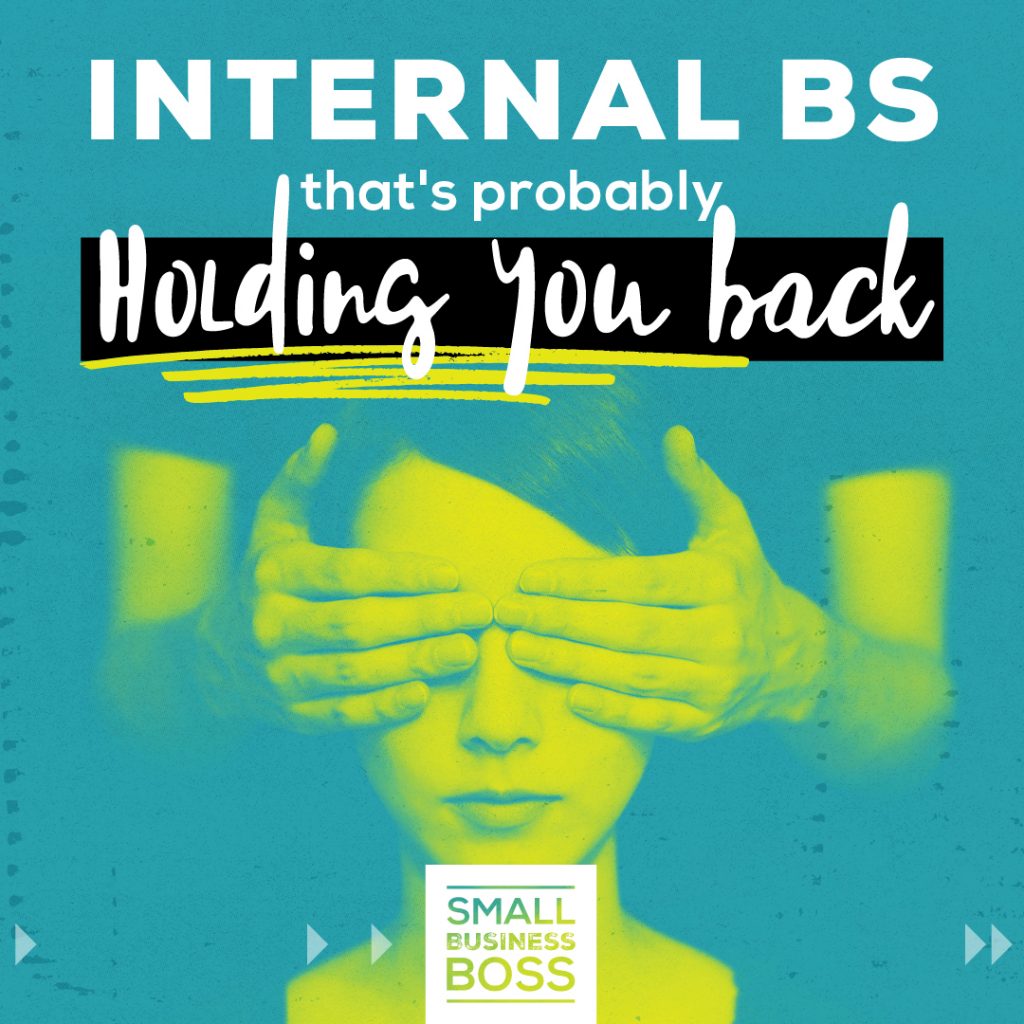
Episode 215: Internal BS That’s Probably Holding You Back
When it comes to building a business, there’s a complete list of things that can stand in your way. But the ones we least expect tend to be the internally-driven ones, you know, the BS stories, ideas and beliefs we have that can keep us stuck and hold us back from what we truly want. In this episode, we’re unpacking that internal BS in detail.
Before we dive into this episode, a little bit of housekeeping, starting with the fact, that if you’ve not yet listened to the episode on building a BS-free business, you should go back and listen to that. These two episodes go hand in hand, and the context of what a BS-free business is will be helpful as you listen to this.
As a business owner, you’re probably no stranger to the idea of mindset work. I’ve definitely done my fair share of work on my mindset, and I continue to work on it. And that’s a big reason I wanted to dive into the internal BS that holds us back both in life and in business.
I do want to point out a few things before I get into the nuts and bolts of specific internal BS I’ve had to deal with. First, I’m not an expert on any of this and I’m definitely not a mental health expert. I’m coming at this from the lens of my personal experiences and I want to be responsible in how I discuss this.
Plus, I need to acknowledge that all the mindset work in the world isn’t designed to deal with systemic failures around race, or the ongoing existence of the patriarchy. And my lived experience is one of privilege as a white, heterosexual, woman who’s not living with a disability.
Now, let’s dive into four areas of the internal BS that holds us back.
Imposter Complex or the Lies We Tell Ourselves
I’ve talked about imposter complex at length on the podcast, and with good reason. Anyone who’s high functioning likely has dealt with imposter complex which has you doubting your accomplishments and a fear of being exposed as a fraud.
Imposter complex is tricky as it shows up many different ways. In fact, my friend Tanya Geisler which specializes in work around imposter complex has identified 12 lies it tells you. And I’ve worked on my specific ones in-depth with Tanya.
And before you’re too hard on yourself, just know that if you have imposter complex, it’s actually a good thing as it means you care. People who are phoning it in don’t have these internal feelings and dialog with themselves.
It also means you don’t have to continue to live with it. For me, my imposter complex shows up in a few different ways. First, it’s that I’m all or nothing. I’m either freakin’ amazing or I totally suck. There’s no halfway. And I’ve had to learn to challenge that thinking as those extremities aren’t real, it’s a continuum.
Another big one for me is the idea that I’m not ready. I could teach a masterclass in this one. My internal voice tells me, “Oh Maggie, we can’t possibly do that. We’re not ready.” But here’s what I figured out. I’m never going to be ready to do anything according to that voice, and if I listen to it, well, I’d still be working my agency job.
And finally, this one I’ve managed to make a lot of progress on….is that asking for help is for the weak. Does this sound familiar? I’ve shared stories about this recurring problem here on the podcast before, like the time I rented a car to drive myself home from the airport instead of asking my sister or a friend for a ride.
Because the agenda of this lie is to keep you isolated. And as a business owner, this one will impact how you perform in your business, and is a one-way ticket to burnout town. There are no bonus points for doing this one on your own. Believe me, I’ve tried, and it didn’t go so well.
Your imposter complex may show up differently and I’ll link to Tanya’s list over in the show notes. But just know, however your imposter complex shows up, it’s some serious internal BS that you don’t have to settle for.
Business Needs to Be Hard
In the last episode, I shared how the goal of a BS-free business is one that’s simple and sustainable. And it really can be that easy.
But so many times we have this idea that business NEEDS to be hard. That we have to work hard, we have to do all these things a certain way, we have to log all the hours, we have to be constantly available to our clients…..and none of it is true.
This is our default programming. The truth is, yes, building a business isn’t for the faint of heart, but that doesn’t mean it has to be hard every single day.
I’ve thought a lot about where this comes from, and honestly, it’s baked into us from childhood with the stories of how successful business owners (and people in general) pulled them up by their bootstraps. They overcame adversity. They hustled their faces off.
And I think now in 2020, we can admit that this is only one story. But we’re subjected to extremes where it’s either the rags to riches story OR some misleading making money on autopilot while you sleep story. The truth is somewhere in the middle, and it’s up to us to learn and accept that it can be simpler than we allow it to be.
For years, I couldn’t believe that it really was as easy, or simple, as it was. But I didn’t realize at the time that at its core, a service business doesn’t need to be hard or complicated. So instead, I found ways to make it MUCH harder than it needed to be.
And honestly, it was a lot of wasted time and energy that didn’t move the needle. As a service business owner, the goal should be to focus on the core areas of the business, finding, booking, and serving clients, along with the high-level aspects of running the business like managing money. Period. No bells, no whistles.
Money Mindset
Your beliefs around money are mission critical as a business owner. And I don’t mean in a woo woo let’s manifest abundance kind of way.
Your money mindset bleeds into most of your decision making on a daily basis when you own a business. Even the simplest decisions from “should I assign team member X” to “how much time did this take me” are impacted by how we think about money.
Let me explain by using myself as an example. Growing up, there was constant money strain in my house. If my mother had a catch phrase around money during my childhood it would be “we can’t afford it”. I was taught that money was limited and that we didn’t have enough. That there was never enough money.
That story of “we can’t afford it” is something I’ve deeply internalized. My literal default thinking around everything from grocery shopping to my business was guided by the “we can’t afford it” storyline.
I’ve had to learn that it’s not about affording/not affording but instead making a decision based on factual information and my pre-established goals. The “we can’t afford it” story is completely emotional, when really making those money decisions is based on my choices. I have the power to decide and I make choices based on facts, not emotions.
Not to mention, I’ve had to get my husband to stop saying it too!
Your money stories are powerful and they bleed into your business, especially when it comes to packages, pricing, invoicing, how much you pay yourself and revenue goals. When you’ve got stories in your head, they’re BS that holds you back from charging more money, getting paid based on your skills, collecting money from clients, and ultimately how much money your business makes.
Remember, money mindset isn’t all about law of attraction and manifesting, but rather your thoughts around money. The stories and beliefs we have around money are powerful, and they can hold you back in so many ways. (Like the story I had for years about how if I made more money I’d be a horrible person….but guess what, it’s not true!)
As we wrap up, ask yourself what internal BS is holding you back in your business. Remember, each of these three areas hold you back daily as you make decisions, and on an ongoing basis as you plan and vision for the future. You don’t need to tackle all of them all at once, but start with one of them and start to unpack it. And if you need further resources, check out the show notes for some of my favorites.
Finally, make no mistake, this internal BS is something that requires ongoing effort and awareness to address. I’ve been doing it for years, and I expect to continue to do this work for years to come.
Managing these stories, patterns and beliefs that all add up to our mindset isn’t a one and done event, but instead a lifetime of incremental improvement. I still have to ask for help and check my money mindset, the difference is that I have tools to help cut the BS. And that’s what I want for each of you, and most of all for you to know that all of this is normal. You’re not weird. You’re totally normal.
Links for this episode
- Tanya Geisler – 12 Lies of the Imposter Complex
- What I Learned About Investing in My Success By Spending $72,700
- Stop Worrying About the $5 Latte with Nechelle Bartley
- Sarah Von Bargen on the Prosperity Gospel
- Nechelle Bartley on Money Basics for Your Service Business


